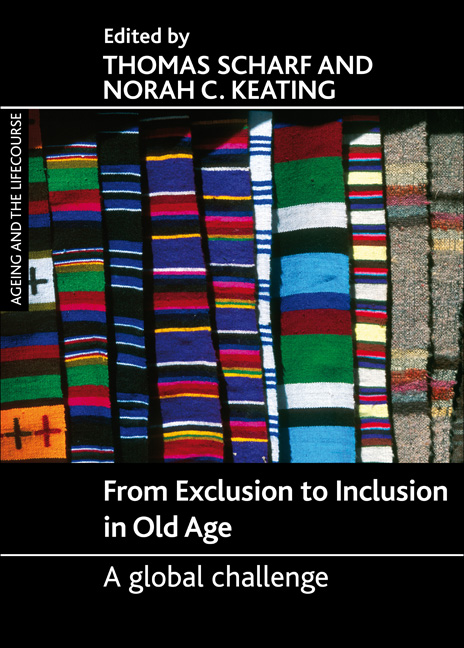Book contents
- Frontmatter
- Dedication
- Contents
- List of tables and figures
- Acknowledgements
- Notes on contributors
- Foreword
- one Social exclusion in later life: a global challenge
- two Globalisation, economic recession and social exclusion: policy challenges and responses
- three International migration: patterns and implications for exclusion in old age
- four Social inclusion of older people in developing countries: relations and resources
- five Exclusion from material resources: poverty and deprivation among older people in Europe
- six Social inclusion of elders in families
- seven The impact of changing value systems on social inclusion: an Asia-Pacific perspective
- eight Age discrimination as a source of exclusion in Europe: the need for a human rights plan for older persons
- nine Towards inclusive built environments for older adults
- ten Revisiting social exclusion of older adults
- Index
eight - Age discrimination as a source of exclusion in Europe: the need for a human rights plan for older persons
Published online by Cambridge University Press: 07 September 2022
- Frontmatter
- Dedication
- Contents
- List of tables and figures
- Acknowledgements
- Notes on contributors
- Foreword
- one Social exclusion in later life: a global challenge
- two Globalisation, economic recession and social exclusion: policy challenges and responses
- three International migration: patterns and implications for exclusion in old age
- four Social inclusion of older people in developing countries: relations and resources
- five Exclusion from material resources: poverty and deprivation among older people in Europe
- six Social inclusion of elders in families
- seven The impact of changing value systems on social inclusion: an Asia-Pacific perspective
- eight Age discrimination as a source of exclusion in Europe: the need for a human rights plan for older persons
- nine Towards inclusive built environments for older adults
- ten Revisiting social exclusion of older adults
- Index
Summary
Introduction
In Europe, people are living longer and in better health than ever before (Jagger et al, 2011). The rise of multigeneration societies has created the potential for unprecedented forms of exclusion and discrimination that are intertwined with age, giving rise to new images of ageing and old age and to different attitudes towards old age among older and younger persons. Yet it would be unwise to conceive of ageing per se as a cause of exclusion. In fact, the problem of social exclusion based on age may take different forms in different countries, reflecting their diverse age profiles and expectations as well as differing cultural orientations to age. The very complexity of these differences calls for a reconsideration of the application of distributive justice and highlights the need for a human rights-based approach that includes the old and very old. In this chapter, we argue that the promotion of social inclusion – with a sustainable governance system – through the allocation of equal rights to people of all ages represents an important element of a ‘society for all ages’ (UNECE, 2008).
The European Commission (2000a) regards ‘discrimination’ as being the application of different treatment in a negative and unfavourable way, on the basis of race or origin, ethnicity, religion or convictions, handicap, age, or sexual orientation. In addressing the theme of social exclusion based on age discrimination in Europe, this chapter begins with a review of core processes of discrimination and exclusion based on old age, such as ageism, stigmatisation and stereotyping. Where appropriate, recent European data are presented to illuminate these processes. The chapter then evaluates a range of existing policy responses to age discrimination and exclusion in the form of legislative instruments available in European nations. Extending the lens beyond Europe, the focus then moves towards a variety of mechanisms and programmes initiated by the United Nations (UN) in the field of older persons’ human rights.
Social exclusion: generation and age
As noted in Chapter One, social exclusion can take many forms depending on the types of individuals or groups that are affected, the immediate social context, and the broader societal context. For example, exclusion takes different forms in education, health, housing, business or community contexts (Abrams et al, 2007).
- Type
- Chapter
- Information
- From Exclusion to Inclusion in Old AgeA Global Challenge, pp. 125 - 144Publisher: Bristol University PressPrint publication year: 2012



